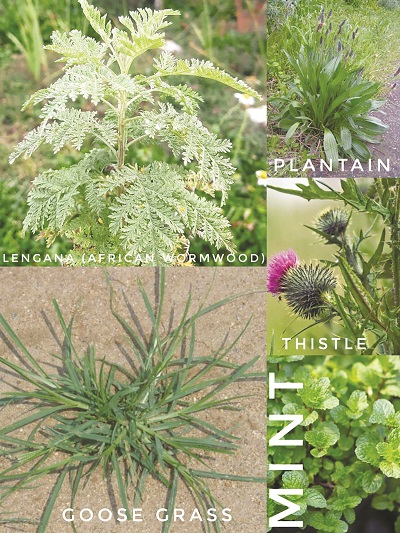RETHINKING THROWING AWAY WEEDS
By:Lesira Rampa
The Mountain Kingdom’s natural environment is home to unique biodiversity. A fact often times devalued as more or less Basotho unmindfully disregard environmental conservation either as a result of thrusting aside important vegetation or by wholly turning away from alternative medicine to a total shift towards modern medicine. Sure! It is commendable to keep our yards clean, from trimming the lawn to uprooting weeds in the garden. Nevertheless you might just be cutting down and discarding some of the most useful ‘weeds’ or plants that could relieve your aching back ,subside feelings of anxiety, or a cure to cystic acne you could not find an effective product for. Maybe your next healing is from boiling the herbs in your garden. Let us take a deeper look into grandma’s remedies – A ticket to your wellbeing!
GOOSE GRASS
This is the most common plant in Basotho’s yards and normally do not think twice before disposing it. Yet the medicinal properties in this herb are verily abundant. As per an informed source, when boiled in water for few minutes and drunken as tea, it has potential to treat diseases such as diabetes when regularly consumed as it comprises anti diabetic properties. High blood pressure and ovarian cysts and fibroids are no exceptions. The goose grass is said to be a great anti-inflammatory for diseases of the female reproductive system.
PLANTAIN (Tee ea Baroa)
Plantain is excessive usually in waste places or lawns where it is regarded as a weed and possesses parallel veins on its leaves. Plantain is a remedy for insects including snake bites, it therefore contains anti-irritant properties that sooths irritation or itchiness from bees or ant bites. This is achieved by extracting the juice from the plantain by way of crushing its leaves. When the leaves are boiled in water and consumed as tea, it helps treat heartburn, ingestion and ulcer, including to relief painful period cramps and slows down heavy bleeding. It is a whole magic plant.
THE THISTLE (Mohatollo)
The thistle is one herbaceous plant typically possessing a prickly stem and leaves with rounded heads of either white or pale purple flowers. It is commonly found in mountainous areas of Lesotho where there is moist soil near slopes. This herb recovers health in general when taken as a stimulant. It revitalizes the body when tired together with sore limbs – taking a hot bath infused with this medicinal herb relieves pain. There is more; the thistle remedies impotence in men and combats liver poisoning.
MINT (Kuena)
Beautiful herb! This plant thrives a lot in moist and sunny places and has aromatic leaves. It is great for nasal congestion. Basotho put it inside their noses to prevent or cure colds and flus. Another interesting value, It is perfect in functioning as a sedative in both kids and adults for restlessness – GOODBYE INSOMNIA! You grow vegetables in your garden? Grow this plant to dispel nasty pests that pose a threat to your vegetables. This is called companion planting, which is a prehistoric practice that pairs particular plants for shared benefits or for the advantage of another plant. The minty scent serves to deter pests.
AFRICAN WORMWOOD (Lengana)
The world is a really challenging place as it is, but being inflicted with anxiety makes it frustrating on an ultimate scale. It is a silent battle I presume many battle with frequent times. Fortunately, there are plants possessing potential in reducing from mild to intense anxiety when consumed with hot water. The African wormwood is commonly known in Lesotho to abate colds and fevers, yet it also has calming properties that may aid in reducing intense anxiety. Preparing a hot infusion with the leaves of African wormwood and consuming it as tea might actually provide anxiety-relieving effects. However it is important to consider anxiety treatment is very multifaceted and individual responses may differ and it is highly recommended to consult a local herbalist or healthcare professional well-versed in the traditional usage of this plant and others for appropriate dosage and guidance.
As Basotho we have a responsibility to preserve natural resources for the current and future generations. By nurturing a green mindset from an early age, and instilling knowledge of helpful plants, Lesotho can pave the way for a more sustainable future, safeguarding natural resources for generations to come. These plants and many others could provide quite a decent income for fellow Basotho when grown at a large scale hence eradicating poverty, and promoting economic development by way of manufacturing locally modified products ranging from ointments to medicine.


